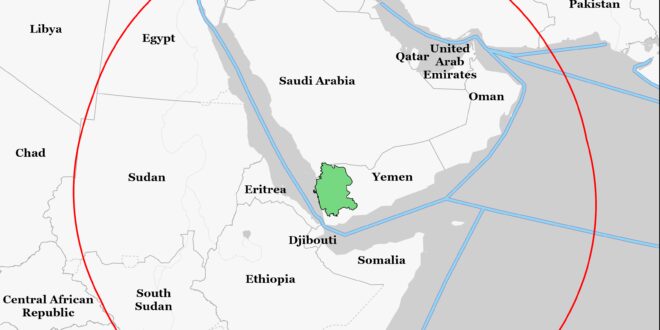Kataib Hezbollah Secretary General Abu Hussein al Hamidawi said during a meeting with unspecified leaders in Iran’s so-called “Axis of Resistance” in Tehran on March 20 that the current pause in attacks on US forces does not mark the end of efforts to expel US forces from Iraq .[i] Hamidawi said that he and the unspecified leaders discussed challenges and the timing of “resistance” activity.[ii] He argued that “the politicized and the weak” must be prevented from interfering in this effort.[iii] Hamidawi was likely referring to Iraqi Sunni political parties that Iranian-affiliated Iraqi Shia parties have accused of blocking attempts to remove US forces from Iraq.[iv]
Israeli forces continued to conduct an operation in and around al Shifa Hospital in Gaza City on March 20. Israeli special operations forces and the Israel Defense Forces 401st Brigade (162nd Division) killed approximately 90 Palestinian fighters and located weapons in the hospital area on March 20.[v] An Israeli Army Radio correspondent reported that the IDF has apprehended about 350 suspected Hamas or Palestinian Islamic Jihad (PIJ) fighters in the hospital since the operation began.[vi] Israeli forces detained PIJ Political Bureau member Khaled al Batsh during the operation.[vii] The IDF noted that several Hamas battalion commanders were at the hospital but added that Gaza City Brigade Commander Izz al Din al Haddad was not present and is still at-large. Haddad is responsible for some of Hamas’ reconstitution efforts.[viii]
The Israeli Army Radio reported that the IDF assessed that Hamas may have tried in recent months to rebuild the underground tunnel system under al Shifa Hospital.[ix] The report clarified that Hamas could not hide weapons in the rebuilt tunnels and its fighters were unable to use the tunnels to exfiltrate from the hospital area. Israeli forces initially expanded clearing operations to al Shifa Hospital in November 2023.[x] An Israeli think tank analyst told the RAND Corporation in 2016 that during previous operations the IDF found that the Gaza Strip’s sandy soil means that tunnels are difficult to rebuild.[xi] Hamas and PIJ’s decision to use al Shifa to launch and direct operations after Israel’s initial clearing operations illustrates that Hamas will resume operations in areas without an Israeli presence, however.
Key Takeaways:
- Iraq: Kataib Hezbollah Secretary General Abu Hussein al Hamidawi said during a meeting with unspecified leaders in Iran’s so-called “Axis of Resistance” in Tehran that the current pause in attacks on US forces does not mark the end of efforts to expel US forces from Iraq.
- Gaza Strip: Israeli forces continued to conduct an operation in and around al Shifa Hospital in Gaza City.
- Negotiations: Hamas’ senior representative to Lebanon Osama Hamdan said on March 20 that Israel responded negatively to Hamas’ ceasefire proposal.
- West Bank: The IDF Air Force killed four Palestinian fighters, including two low-level PIJ leaders, in a drone strike in the Jenin refugee camp.
- Southern Lebanon and Golan Heights: The IDF said that it has degraded Hezbollah’s ability to transfer weapons since the beginning of the Israel-Hamas war.
- Yemen: The Houthi supreme leader said on March 15 that the Houthis intend to target international shipping transiting the Indian Ocean and around the Cape of Good Hope. This statement is likely aspirational given the current maximum range of Houthi weapon systems, which is roughly 2,200km.
- Iran: Iranian Supreme Leader Ali Khamenei acknowledged the Iranian government’s shortcomings in “controlling inflation” and economic production during his Nowruz speech.
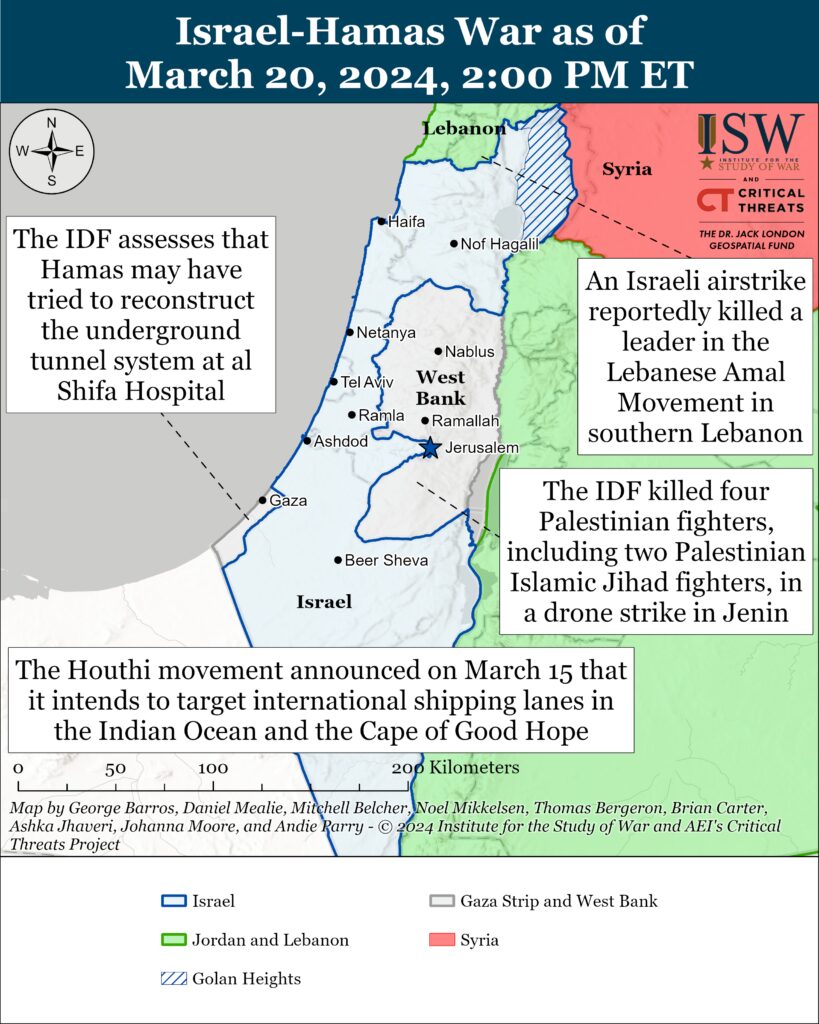
Gaza Strip
Axis of Resistance campaign objectives:
Erode the will of the Israeli political establishment and public to launch and sustain a major ground operation into the Gaza Strip
Degrade IDF material and morale around the Gaza Strip.The IDF 215th Artillery Brigade (162nd Division) directed an airstrike targeting six Palestinian fighters in Jabalia on March 20.[xii] Israeli forces previously struck Hamas and Palestinian Islamic Jihad (PIJ) infrastructure in Jabalia on March 6 after Palestinian fighters launched rockets into Israel from Jabalia.[xiii]
Palestinian militias continued attempts to disrupt Israeli ground operations in Gaza City on March 20. Several militias reported that their fighters engaged Israeli forces near al Shifa Hospital with small arms.[xiv] Hamas published footage of its fighters targeting Israeli armor south of al Shifa Hospital with RPGs.[xv] Palestinian sources reported engagements between Palestinian fighters and Israeli forces west of al Shifa Hospital.[xvi]
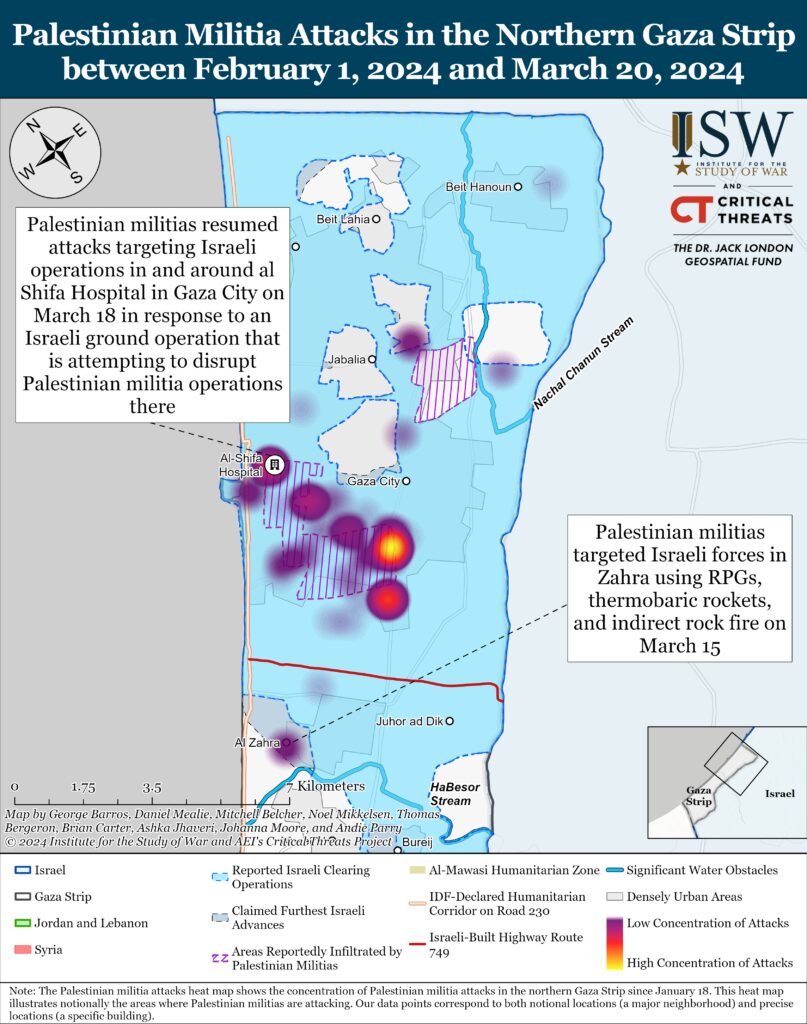
Israeli forces continued clearing operations in Qarara, northern Khan Younis, on March 20. The IDF 7th Brigade (36th Division) killed two Palestinian fighters in the area and attacked military infrastructure.[xvii] Hamas fighters targeted Israeli infantrymen breaching a tunnel in Qarara by rigging the tunnel entrance to explode.[xviii] PIJ fighters also mortared Israeli forces in Qarara.[xix] Israeli forces have been operating in Qarara since March 3.[xx]
The IDF Air Force killed five senior members of Hamas’ Emergency Committees in Rafah.[xxi] Israeli media reported that the Emergency Committees are Hamas organizations that are responsible for maintaining public order and civil control.[xxii] The IDF reported that the five members killed in this strike helped Hamas maintain Hamas control on the ground.[xxiii] They worked to preserve Hamas’ organizational structure in humanitarian areas and were responsible for all Hamas activities including contact with Hamas fighters. The IDF killed the chair of the committees in Rafah last week.[xxiv]
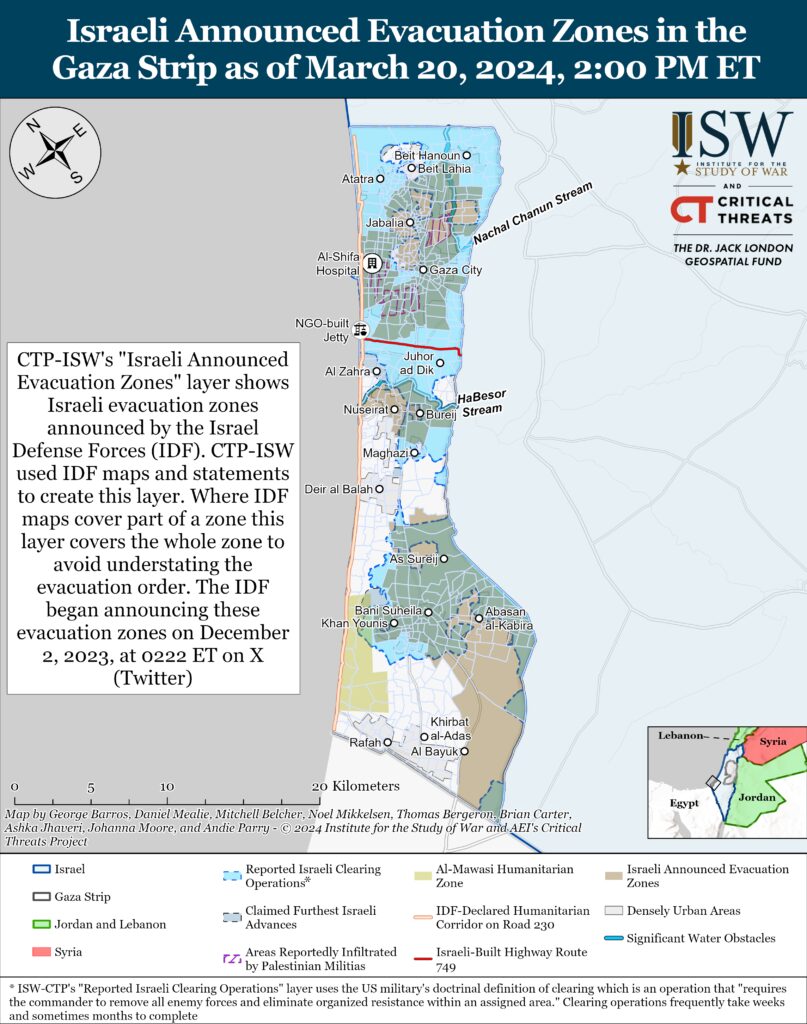
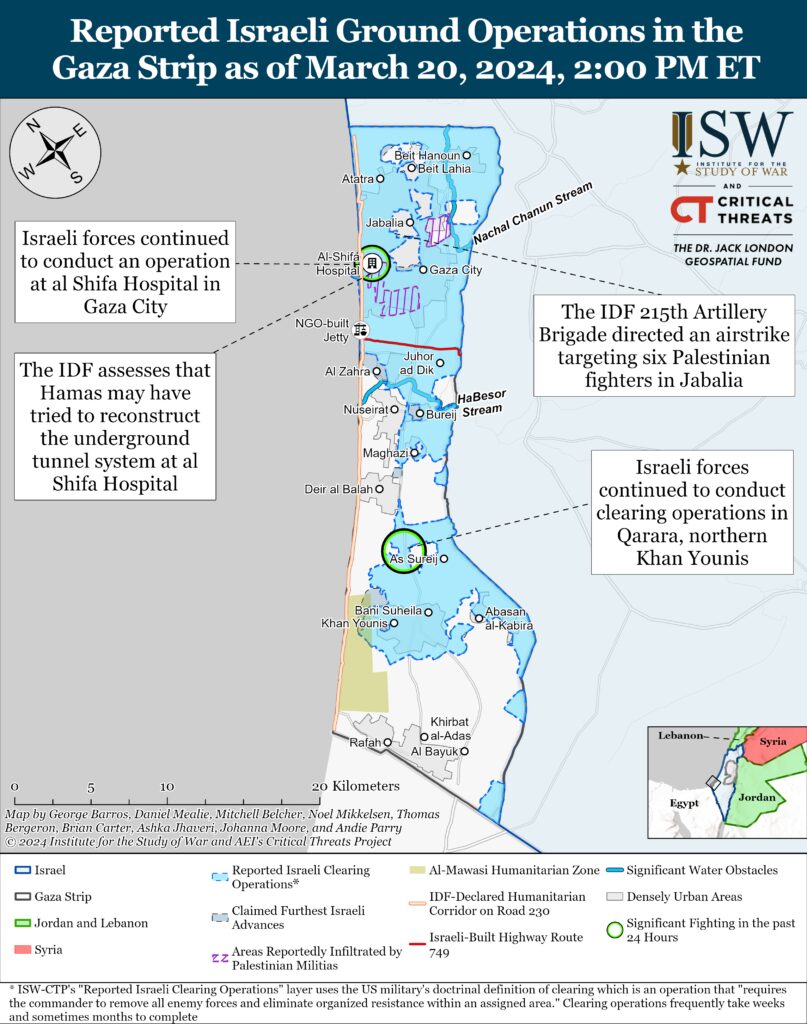
The White House requested that an Israeli delegation visit Washington next week to discuss alternatives to an Israeli ground operation in Rafah.[xxv] Two unspecified US officials told Axios on March 20 that one alternative is to delay a military operation in Rafah and instead focus on stabilizing the humanitarian situation in the northern Gaza Strip.[xxvi] Another alternative is to focus first on securing the Egyptian side of the Egypt-Gaza Strip border as part of a combined US-Egyptian-Israeli plan. Israel confirmed that it will send a delegation to Washington.[xxvii] The New York Times reported on March 19 that Israeli Prime Minister Benjamin Netanyahu said that an Israeli ground operation into Rafah is necessary because there is “no way” to destroy Hamas’ local battalions without one.[xxviii]
The Associated Press reported on March 20 the new Palestinian prime minister would appoint a “non-partisan, technocratic government” supported by the international community and the Palestinian people. The Associated Press cited a mission statement written by incoming Palestinian Prime Minister Mohammad Mustafa.[xxix] Mustafa added that the Palestinian Authority (PA) aims to hold presidential and parliamentary elections. He did not give a timetable and added that the timetable would depend on “realities on the ground” in Gaza, the West Bank, and east Jerusalem. PA President Mahmoud Abbas appointed Mustafa as the new prime minister on March 14.[xxx]
Hamas’ senior representative to Lebanon Osama Hamdan said on March 20 that Israel responded negatively to Hamas’ ceasefire proposal.[xxxi] Hamas submitted a ceasefire proposal and a hostage-for-prisoner exchange to international mediators on March 14.[xxxii] The proposal includes a ceasefire, calls for Israel to release Palestinian prisoners, an increase in the delivery of humanitarian aid to the Gaza Strip, a return of displaced Palestinians, and a withdrawal of Israeli forces from the Strip.
Israeli media reported on March 14 that Israeli Prime Minister Benjamin Netanyahu and Israeli Defense Minister Yoav Gallant disagreed over the issue of humanitarian aid distribution in the Gaza Strip.[xxxiii] Gallant said that Fatah must be involved in distribution while Netanyahu said he is “not ready to hear about the PA.”[xxxiv] Israeli media reported on March 15 that Gallant said that the best option Israel has for the future leader in the Gaza Strip will be local Palestinians who are affiliated with the PA.[xxxv]
Hamas Political Bureau Chairman Ismail Haniyeh said on March 20 that Israeli attacks targeting police officers in the Gaza Strip are harming Israel’s ability to achieve a ceasefire.[xxxvi] Hamas controls several internal security forces, including the Civil Police.[xxxvii]
Israel detected Palestinian indirect fire targeting Sderot, southern Israel, on March 19.[xxxviii] No Palestinian militia has claimed responsibility for the attack at the time of writing. Israeli forces responded to the attack by conducting an airstrike targeting a Hamas tunnel shaft near the fire‘s point of origin.[xxxix]
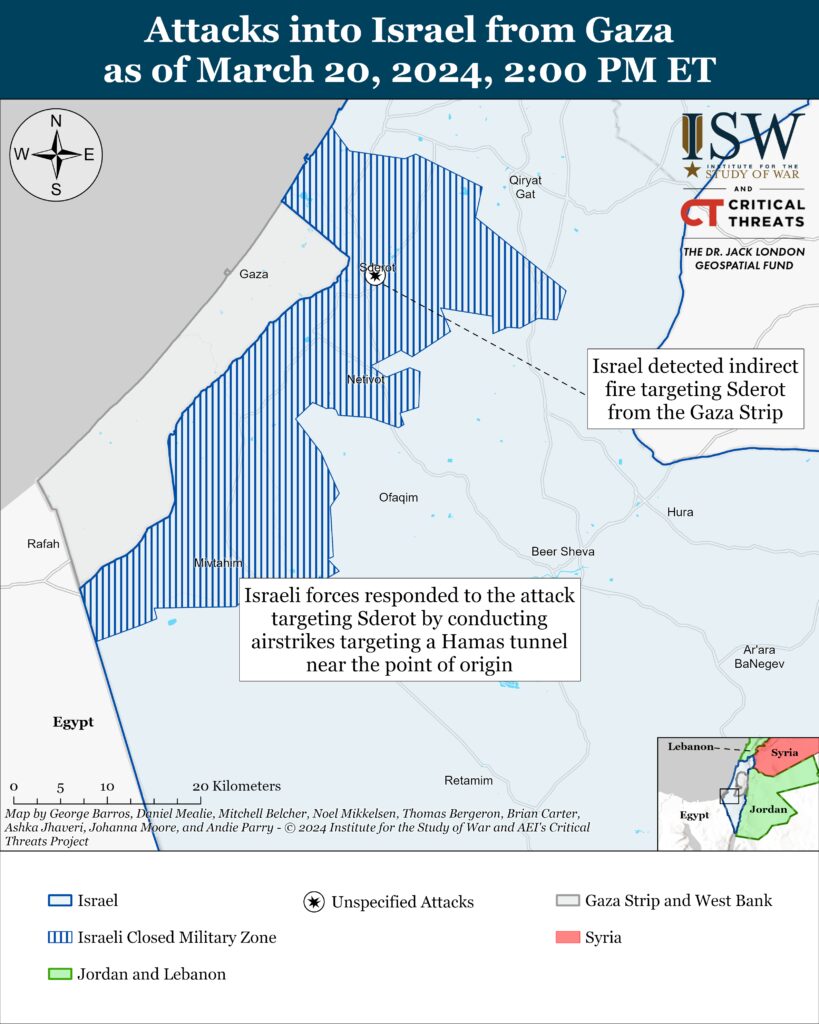
Recorded reports of attacks; CTP-ISW cannot independently verify impact.
West Bank
Axis of Resistance campaign objectives:
Draw IDF assets and resources toward the West Bank and fix them thereIsraeli forces have clashed with Palestinian fighters in at least three locations in the West Bank since CTP-ISW’s last data cutoff on March 19.[xl] Hamas reported on March 20 that its fighters conducted additional small arms attacks targeting Israeli forces and settlements in unspecified areas of the West Bank during an unspecified time frame.[xli] Hamas called for Palestinians in the West Bank and Jerusalem to escalate against Israel.[xlii]
The IDF Air Force killed four Palestinian fighters, including two low-level PIJ leaders, in a drone strike in the Jenin refugee camp on March 20.[xliii] The IDF said that one of the PIJ fighters was a senior PIJ member who killed an Israeli civilian in a small arms attack targeting an Israeli settlement in May 2023. The strike also killed a local PIJ commander in Jenin.[xliv] The IDF said that the two other unspecified fighters killed in the strike directed an attempted suicide vest attack into Israel on March 11. The two fighters also directed an attack in which Palestinian fighters detonated an improvised explosive device targeting Israeli forces in Homesh, near Jerusalem, on March 8.[xlv] Palestinians in Jenin held a funeral service for the fighters on March 20.[xlvi]
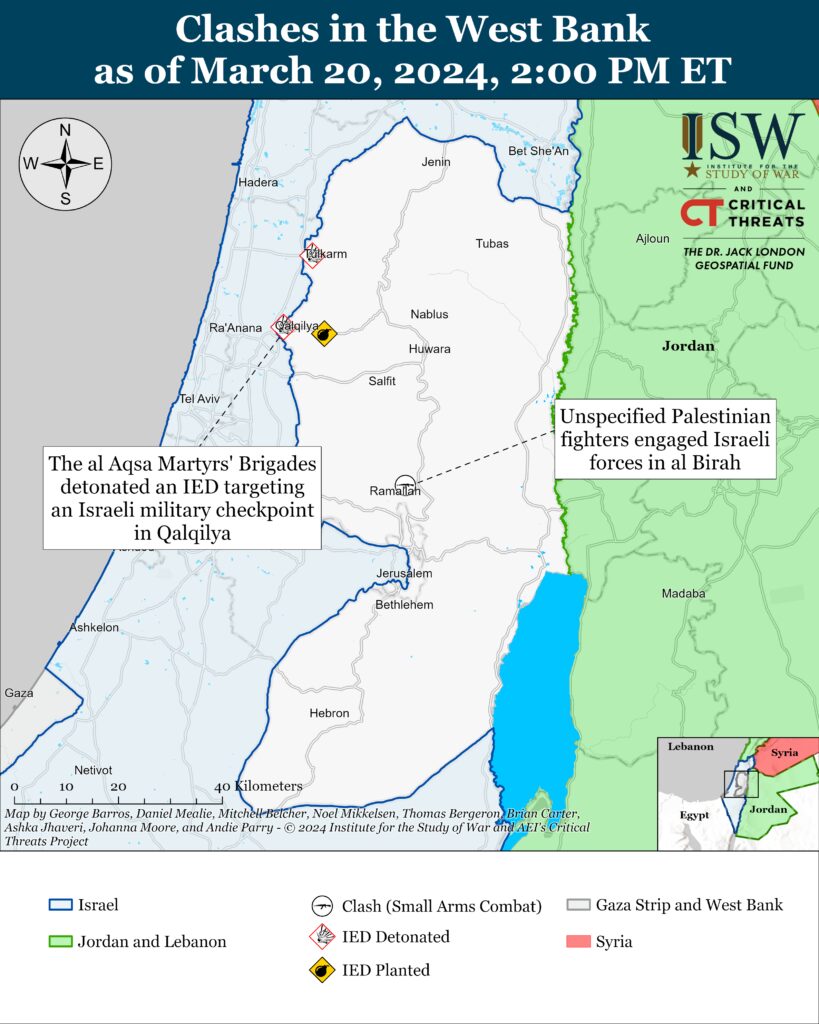
This map is not an exhaustive depiction of clashes and demonstrations in the West Bank.
Southern Lebanon and Golan Heights
Axis of Resistance campaign objectives:
Draw IDF assets and resources toward northern Israel and fix them there
Set conditions for successive campaigns into northern IsraelLebanese Hezbollah has conducted at least seven attacks from southern Lebanon into northern Israel since CTP-ISW’s last data cutoff on March 19.[xlvii]
The IDF said on March 20 that it has degraded Hezbollah’s ability to transfer weapons since the beginning of the Israel-Hamas war.[xlviii] The IDF added that it has targeted Hezbollah’s weapons production facilities since the beginning of the war. The IDF noted that these facilities are in civilian areas in southern Lebanon, the Bekaa Valley, and in Lebanese cities.
An Israeli airstrike killed an Amal Movement leader in al Ghandouriya in southern Lebanon on March 20.[xlix] The Amal Movement released a statement mourning the official on the same day.[l]
Northern Israel
Recorded reports of attacks; CTP-ISW cannot independently verify impact.
Iran and Axis of Resistance
Axis of Resistance campaign objectives:
Demonstrate the capability and willingness of Iran and the Axis of Resistance to escalate against the United States and Israel on multiple fronts
Set conditions to fight a regional war on multiple frontsThe Islamic Resistance in Iraq claimed a drone attack targeting Ben Gurion Airport near Tel Aviv, Israel, on March 19.[li] Israel has not commented on the attack at the time of writing. Ben Gurion Airport did not report any significant flight delays on March 19, suggesting that the drone attack either did not pose a threat to the airport or did not occur.[lii] The Kataib Hezbollah Secretary General said on March 20 that Iranian-backed Iraqi militias must continue their support of Palestinians in the Gaza Strip.[liii] Kataib Hezbollah is part of the Islamic Resistance in Iraq, which began a ”second phase of operations” in March 2024 that is defined by drone and missile attacks targeting Israeli airports and seaports. The Israeli government does not acknowledge many of these attacks claimed by the Islamic Resistance in Iraq, and some of these attacks likely did not occur.
A French military helicopter operating in the Red Sea under European-led Operation Aspides intercepted a Houthi drone over the Red Sea on March 20.[liv] European Council coalition members have shot down eight drones and ”repelled“ three other drones since they launched Operation Aspides on February 19.[lv] Aspides is the European defensive naval coalition operating in the Red Sea.[lvi] The French military said that the drone was “threatening civilian maritime traffic.”[lvii] The European coalition said that its vessels have ”closely protected” 35 merchant vessels in Red Sea.[lviii]
The Houthi supreme leader said on March 15 that the Houthis intend to target international shipping transiting the Indian Ocean and around the Cape of Good Hope.[lix] This statement is likely aspirational given the current maximum range of Houthi weapon systems, which is roughly 2,200km.[lx] Houthi military spokesperson Yahye Saree said that the expanded operation would target all Israel-associated commercial vessels traveling around the Cape of Good Hope.[lxi] The Houthi’s maximum weapon range is 2,200km, which encompasses only some parts of the shipping routes toward the Cape of Good Hope and Indian Ocean, suggesting that the supreme leader’s statement is largely aspirational.[lxii] Vessel traffic through the Red Sea has declined by approximately 50% since January 2024 due to Houthi attacks in the Red Sea and Gulf of Aden.[lxiii] The Cape of Good Hope has seen a 74% increase in traffic compared to 2023 after Houthi attacks forced ships to re-route from the Red Sea and Suez Canal.[lxiv] The Houthis have not conducted an attack outside the Red Sea and Gulf of Aden since the announcement on March 15. Iran did target a vessel 200km off the Indian coast in the Indian Ocean on December 23.[lxv]
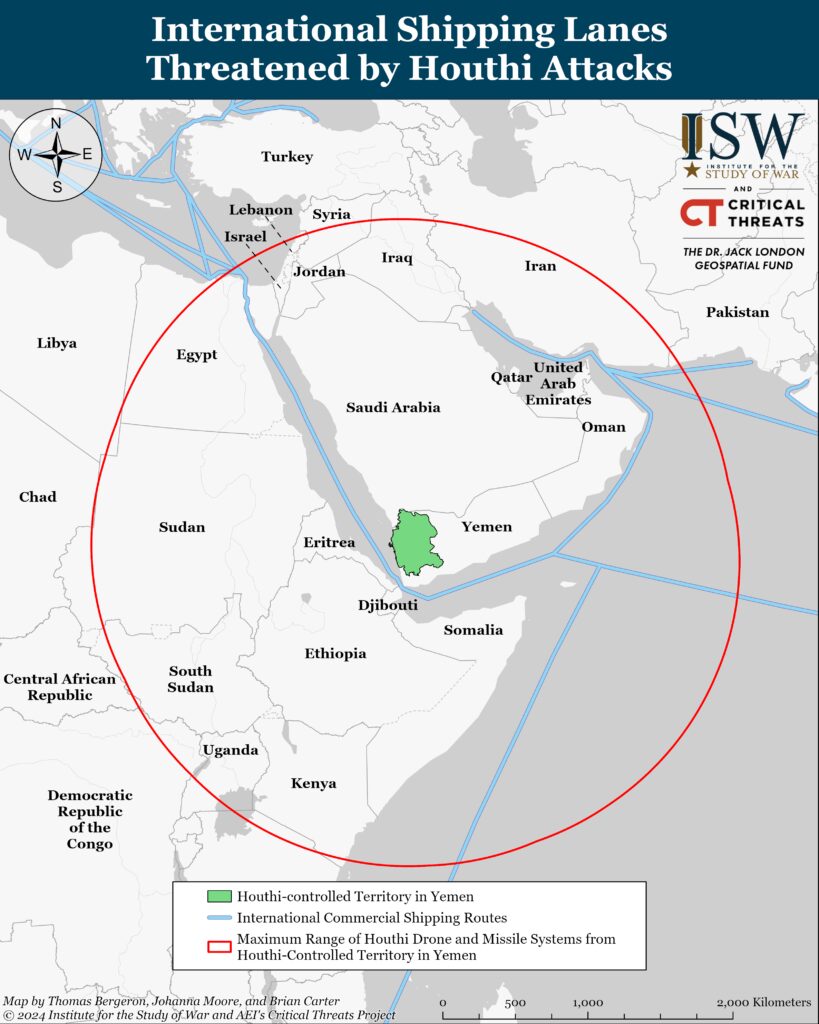
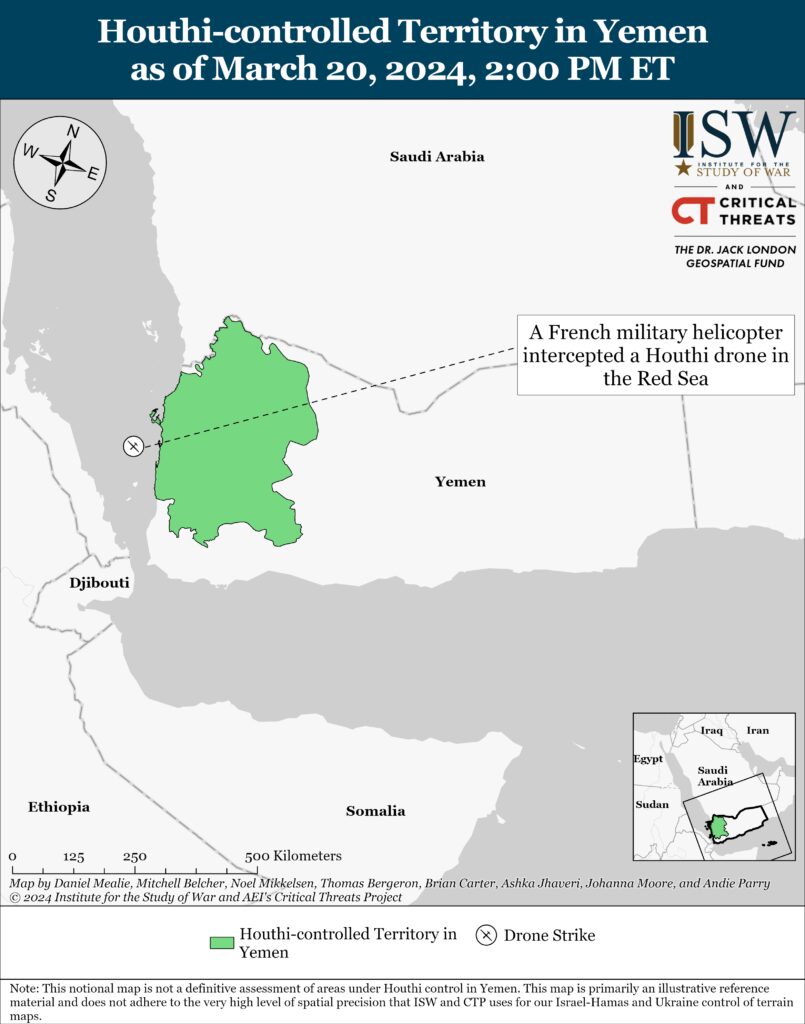
Iranian Supreme Leader Ali Khamenei acknowledged the Iranian government’s shortcomings in “controlling inflation” and economic production during his Nowruz speech on March 20.[lxvi] Khamenei announced “controlling inflation and” economic production as Iran’s new year’s slogan at the beginning of the last Persian calendar year in March 2023.[lxvii] Khamenei stated on March 20, 2024 that the state of inflation and economic production in Iran is “relatively far from what we wanted.”[lxviii] Khamenei said in a separate Nowruz message on March 20, 2024 that Iranians should not expect the regime to address “big issues” such as inflation and production growth “within a year.”[lxix] Khamenei also described the economy as Iran’s “main weakness” and announced a new slogan, “a leap in [economic] production with [the] people’s participation,” for the upcoming Persian calendar year.[lxx]
Iran’s inflation rate is approximately 44 percent, according to Iranian media.[lxxi] The actual inflation rate is likely higher given Iranian officials and media’s tendency to fabricate economic statistics, however. Western and diaspora media recently reported that many Iranians refrained this year from buying goods that they normally would for Nowruz, such as new clothes and sweets, due to high prices.[lxxii]
 Eurasia Press & News
Eurasia Press & News
